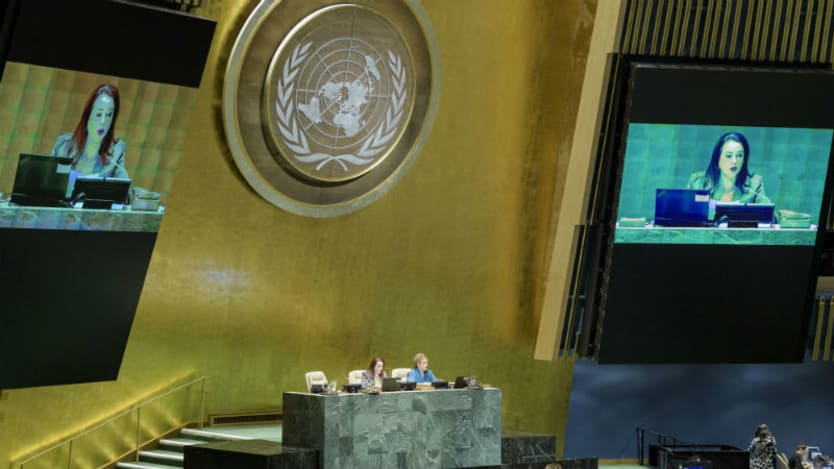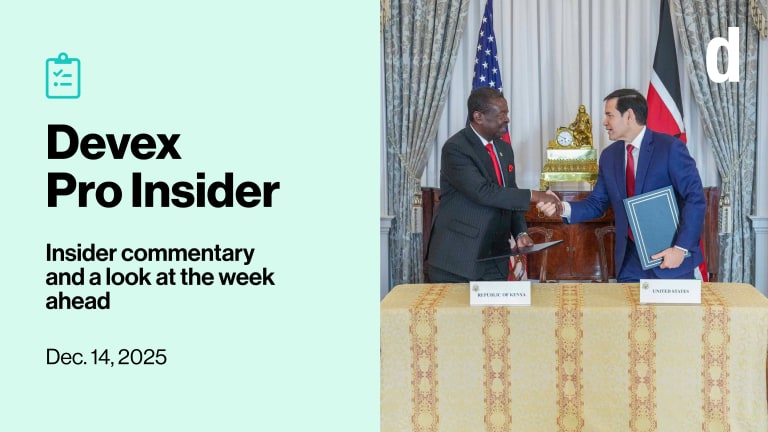
The United Nations adopts a Global Compact on Refugees, the Trump administration weighs new rules for aid to North Korea, and the U.K. tumbles in aid effectiveness rankings. This week in development:
President Donald Trump announced Wednesday that he plans to withdraw U.S. forces from Syria, a decision that could have major implications for the humanitarian and stabilization efforts still underway. Trump’s announcement was met with alarm and criticism from U.S. lawmakers — who cautioned that the military effort against Islamic State is not over — and from NGO leaders — who admonished the administration for putting humanitarian groups at risk. “What message is sent by pulling out the civilians and saying that this is going to be managed out of neighboring countries? This is one of these decisions that's just a bolt out of the blue,” Joel Charny, executive director of Norwegian Refugee Council USA, told Devex.
A new report published Wednesday spelled bad news for British government aid bosses, revealing the country had plummeted 12 places in an aid effectiveness ranking. From 2012 to 2016, the British government dropped from third place to 15th in a ranking of the 27 biggest funders published by the Center for Global Development. The ranking assesses how well donors have upheld internationally agreed principles on aid effectiveness. “The data shows the U.K. is waning as a development leader and that it is giving less effective aid and that it is less focused on the needs of recipients,” Ian Mitchell, a senior policy fellow at CGD, told Devex. The data looked at the spending by the Department for International Development but also the increasing portion spent by other government agencies. The U.K. did particularly poorly on indicators linked to “fostering institutions,” but also slid on some transparency measures, and the share of aid going to “well-governed” countries. However, the donor remained top on supporting global public goods and the use of untied aid.
The U.S. special envoy to North Korea suggested the Trump administration may seek to ease restrictions in an effort to increase humanitarian assistance to the country. “I will be sitting down with American aid groups early in the new year to discuss how we can better ensure the delivery of appropriate assistance, particularly through the course of the coming winter,” Stephen Biegun, U.S. special representative for North Korea, told reporters on Wednesday. In 2017, the State Department banned travel to North Korea, and in recent months had reportedly been limiting humanitarian exemptions to that ban in an effort to put pressure on Pyongyang. Aid efforts are also hampered by sanctions, which aid groups say lead banks and other financial institutions to refuse to deal with them. North Korea suffers from high levels of food insecurity. About 10.3 million people of the country’s population of 24.8 million, are undernourished, according to the World Food Programme. For years, aid groups — and particularly a number of faith-based organizations — have tried to carefully navigate the political and legal pitfalls that accompany humanitarian assistance to the isolated nation.
The United Nations General Assembly endorsed a Global Compact on Refugees, which recognizes that “the predicament of refugees is a common concern of humankind.” The nonbinding agreement garnered broad support. Only two countries — the United States and Hungary — voted against it, while three others abstained. The compact has four objectives: to ease pressures on refugee-hosting countries; to build refugees’ self-reliance and help them thrive; to expand resettlement options; and to support conditions for repatriation. Much like other non-binding U.N. agreements (see: the Paris Climate Agreement), the success of this compact will depend on political leaders stepping forward with commitments. That process will see its first test at the first-ever Global Refugee Forum in 2019, where signatories are expected to share their progress and announce new commitments to improve their political and financial support for refugee populations, according to IRIN.








